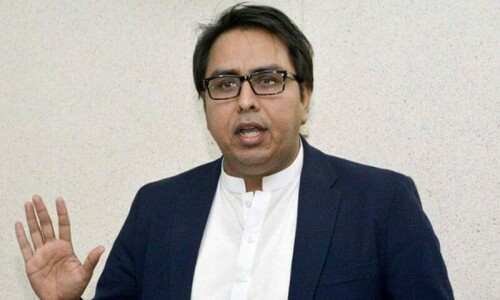The evil that evil men do casts a long shadow, as a German court's recent conviction of former Nazi death camp guard John Demjanjuk brings home. The sight of a 91-year-old working-class immigrant (Demjanjuk hid in plain sight for many years as an autoworker in the US state of Ohio) being sent to prison for five years is pathetic but makes a point. The point is that there is, and should be, no escape from accountability.
So I guess Osama bin Laden has been held accountable, and – notwithstanding the ramifications – that in itself surely is a good thing. Daring though the raid was, the day-after images of clueless neighbours rubbernecking and milling around, and of the man himself on home video wrapped in a chador and watching himself on television, expose a tawdry reality that belies the mystique that bin Laden and his movement thrived on. I'm reminded of journalist Nate Thayer's dramatic scoop in 1997 when he interviewed the dying Pol Pot, who turned out to be living comfortably with a young wife in the Thai jungle, two decades after having presided over the Cambodian genocide.
The smallness and furtiveness of such creatures, together with the unavoidable fact that they are as fully human as any of us, make them pitiable, and pity is the response that will most fully preserve our own humanity. But that's difficult to achieve for a species long in the bad habit of self-justification. If only we had the courage to acknowledge our own involvement and culpability, the world would be a better place.
By "us" I mean all of us. Thirty years after the Vietnamese invasion drove the Khmer Rouge from Phnom Penh, Cambodia's society and landscape remain severely damaged, and the ongoing but halfhearted trials of a few of Pol Pot's aging colleagues show up the complicity of Cambodian and Thai "authorities" – a euphemism for criminals who hold power and wear uniforms – not to mention the United States, which supported the Khmer Rouge materially and diplomatically throughout the 1980s against Vietnam and its protector, the Soviet Union.
I dwell on the Cambodian aftermath because it's all too instructive. Replace "Pol Pot" with "Osama bin Laden" and "Khmer Rouge" with "Taliban" and the resulting picture doesn't flatter anyone, which is why I find the dueling American and Pakistani recriminations that are currently flying around the Internet so depressing. Part of what's depressing is that everyone's anger is understandable. But there's a third faction that I hope most of us belong to: those whose first loyalty is not to Pakistan or to America, but to each other. This is the group I try always to remember and write for and encourage.
The day the news broke of bin Laden's death, I wrote in Dawn.com about how disturbed and disgusted I was by the crowds I was watching on US television, partying in New York and in front of the White House in Washington. I felt those young crowds and their chants of "USA! USA!" to be ominous. Two weeks later, it's both possible and necessary to make a more measured judgment. It's important to note that most Americans were not on television that day, nor were we celebrating. Most Americans I've spoken to since then say they felt relieved but not triumphant, and many expressed distaste and embarrassment at the TV crowds. The Americans crowds that cheered bin Laden's death as if it were a touchdown in a football game are no more representative than the Pakistani crowds that celebrated the death of Salmaan Taseer in January.
I hope that Pakistanis who are understandably offended by US violation of Pakistan's sovereignty will keep in mind that individual Americans don't represent, nor are we necessarily well represented by, the American government. Just as Pakistanis feel – because they are – effectively disenfranchised, so do most Americans. And, like Pakistanis, Americans suffer from myriad distractions both public and personal. Yet another high-stakes presidential election is already starting to loom; the price of gasoline is creeping up toward the historic threshold of $5 per gallon, with large implications for the long-cherished "American way of life" that we're only beginning to appreciate; and the Mississippi River is flooding at levels not seen since 1927. Pakistanis who experienced or witnessed last summer's severe flooding of the Indus know the human suffering such a disaster entails.
Something else both Americans and Pakistanis need to keep in mind, and find ways to come to terms with, is the sheer youth of the crowds in both countries. If it's true that 40 percent of Pakistanis are below the age of 15, then surely Pakistan's most urgent national tasks are to provide them with education and meaningful employment. Those young people are in great need and, although some of them are misguided, they were innocent toddlers the day bin Laden's minions killed 3000 Americans. Similarly, the American children of 9/11 came of age, through no fault of their own, in a time of terror and paranoia. They need to be led gently and compassionately away from the fear and hatred of Islam and Muslims that they've been raised to feel. And I know, from my own direct experience interacting with them at speaking engagements on college campuses all around America, that many of them are already leading themselves and each other in the right direction.
"The best way to destroy an enemy," said Abraham Lincoln, "is to make him a friend." Let's be friends.

Ethan Casey is the author of Alive and Well in Pakistan and Overtaken By Events: A Pakistan Road Trip. He can be reached at www.facebook.com/ethancaseyfans and www.ethancasey.com.
The views expressed by this blogger and in the following reader comments do not necessarily reflect the views and policies of the Dawn Media Group.















































